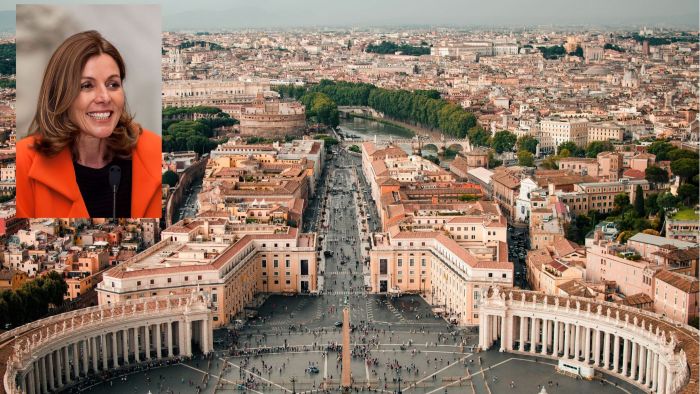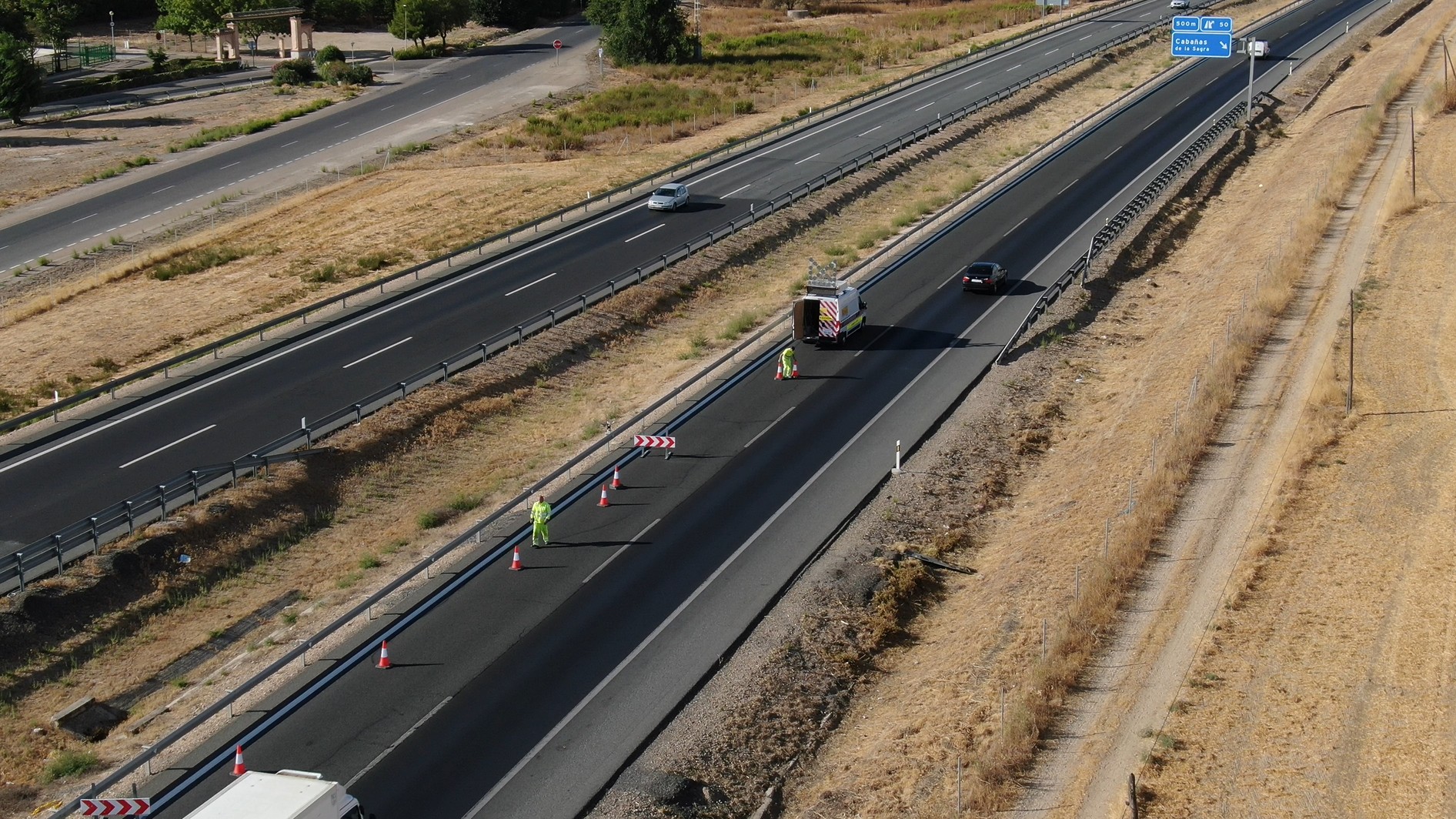Average headcount
Employees
Key figures for 2025
| € million | 2025 | 2024 | Var |
|---|---|---|---|
| Revenue | 4,660 | 4,571 | +2% |
| EBITDA | 1,358 | 1,352 | - |
| Net income excluding divestments | 165 | 113 | +46% |
| Operating cash flow | 1,359 | 1,294 | +5% |
| Backlog (Engineering and Infrastructure) | 12,470 | 10,606 | +18% |
| Backlog (Sacyr Water) | 6,979 | 4,826 | +45% |
AVERAGE HEADCOUNT 14,841
Emissions reduction for the 4th consecutive year
of waste is recycled, reused and recovered in 2025
Environment
€ Million
Training
thousand hours
Environmental impact assessment of
Suppliers assessed

Unsplash / Governatorato SCV
The Historian Safeguarding the Secrets of the Vatican
Barbara Jatta, an Italian art historian, is the first woman to lead the Vatican Museums in more than five centuries. Her appointment by Pope Francis at the end of 2016 marked a historic milestone for the institution.
02/03/2026
ISABEL RUBIO ARROYO | Tungsteno
Barbara Jatta, the first-ever female director of the Vatican Museums in over five centuries, is responsible for safeguarding and restoring some of the Vatican’s most inaccessible spaces: sealed chambers, hidden storage rooms, and restricted areas where manuscripts, frescoes, and objects too fragile to be displayed are conserved. Under her supervision, specialised teams labour quietly, employing techniques ranging from traditional craftsmanship to the use of lasers, 3D scanning, and advanced conservation systems. Jatta safeguards a heritage that few ever see, yet one that underpins the world's most significant artistic and religious history.
Breaking Ceilings: The Story of Barbara Jatta
In 2017, Barbara Jatta made history by becoming the first woman to lead the Vatican Museums in their 516-year history. Given the site’s immense artistic importance, some say she shattered not merely a glass ceiling, but a “frescoed ceiling.” Born in Rome and academically trained in Art History, Jatta had spent more than two decades at the Vatican Apostolic Library before assuming what is widely regarded as one of the most coveted positions in the art world.
Today, she oversees a treasure trove of more than 200,000 works of art, spread across 11 kilometres of galleries, and oversees seven restoration laboratories. Under her leadership, the museums are not only preserved but increasingly digitised: virtual tours and online catalogues allow the Vatican's artistic heritage to reach audiences worldwide. With every decision about what to exhibit or what to keep secret, Jatta breathes life into a legacy that is both cultural and spiritual.
Jatta looks back on her journey at the helm of a collection of more than 200,000 works of art. Credit: EWTN
What Remains Unseen in the Vatican Museums
The proportion of works on display compared with those kept in storage varies depending on the type of art. “If we look at the percentage of what is on display and what is in [storage], it is amazing. Certain collections have only 1% on display,” she explained in an interview. In the case of painting and contemporary art collections, she estimates that the ratio is “25% on display and 75% in storage.” The institution seeks to “rotate some collections to show them better,” especially those that are easier to move, such as contemporary art and paintings.
Although Jatta is responsible for safeguarding monumental masterpieces such as the Sistine Chapel, her favourite work is a small painting of the Virgin and Child by Fra Angelico, located in Room IV of the Pinacoteca, which often goes unnoticed by many visitors. One of her preferred locations within the entire complex is the Belvedere Terrace. Designed by Bramante in the 16th century, this area is closed to the public and offers a view over Vatican City.
The Virgin and Child between Saint Dominic and Saint Catherine of Alexandria. Credit: Fra Angelico / Vatican Museums Pinacoteca
Within the complex, Jatta has experienced many unique moments. She recalls walking through the empty galleries during the pandemic lockdown, accompanied only by a small number of guards. She describes the experience as “terrifying” and “magical” at the same time, like being in a ghost town. During that period, the institution faced a profound financial crisis, as the Vatican Museums—unlike other large museums—rely exclusively on ticket sales. After a year of intermittent closures, Jatta acknowledges that anxiety spread: “People around us were talking about selling our objects to survive.” She describes the institution's recovery as a “miracle” that allowed activities to resume without the need to part with its artistic heritage.
From the Vatican to the World
Today, Jatta is a member of prestigious international organisations, such as the Scientific Council of the Louvre Museum and the International Advisory Committee of the Hermitage Museum. Over the course of her career, she has received numerous distinctions, including the Order of the Star of Italy (2019), Commander of the Royal Order of the Polar Star of Sweden (2020), and the rank of Officer of the Order of Arts and Letters of France (2021).
This international recognition reflects her view of art as a spiritual bridge that unites cultures and nations. For this reason, the museums under her direction organise exchanges with countries such as China, Mexico, and Chile. Jatta describes the collections as an “invaluable heritage of creativity, civilisation, art, history, and tradition.” This richness is valued not solely for the objects themselves, but also for the devotion that ensured their preservation across the centuries.
Tungsten is a journalistic laboratory that explores the essence of innovation.

Lane Closures: An Immersive View
We make drone and 360º camera recordings of various operations of assembly and disassembly of lane cutting in highway or freeway, in real situation, in order to analyze from the aerial view the process of execution of such operations and increase their safety.
27/01/2026
Simón B. Maestra Navarro
Southern Zone Delegate, Sacyr Conservación
Marco A. García Fraga
HSE Business Partner, Sacyr Conservación
At Sacyr, accident prevention is not a separate business function, but an integral element considered in all tasks that may involve risk. Occupational Health and Safety (OHS) is integrated into technical and operational processes, planning, and working conditions from the start.
Sacyr Conservación guarantees a comprehensive service, adhering to the strictest Health, Safety, and Environmental (HSE) standards, including Road Safety and Quality, to which Sacyr Maintenance has dedicated significant resources in recent years.
While lane closures may not cause the most incidents, they are among the riskiest road maintenance operations. This is due to both the need for vehicles to stop on the shoulder and the exposure of operators crossing the road to place signage and beacons.
Sacyr Conservación anticipated the guidelines of Service Note 02/2021, "Recommendations for Improving Safety in Maintenance and Other Work Affecting State Roads and Highways." We pioneered aspects outlined in the note, such as in-person road safety training, the acquisition of double-gate vans, and innovative training proposals like "Lane Closures: An Immersive View."
There is no doubt that the advancement in the use of light signaling in maintenance vehicles has greatly improved the protection of equipment, maximizing visibility and minimizing risks. The goal is to visualize the behavior of road maintenance personnel during lane closure setup and takedown and to understand how they are affected by traffic. The goal is not strictly limited to improving the material signalling equipment and compliance with the elements set out in current regulations.
This focuses on visualizing the actions of road maintenance personnel during lane closure setup and takedown and how these actions are impacted by the traffic conditions of the worksite.
New Technologies in Road Management
In an increasingly demanding, digital, and complex environment, where specialization and technology are key factors for the large-scale transformation of service standards, Sacyr Maintenance is committed to innovation, developing a large number of certified projects and lines of research.
The use of drone and 360° camera recording significantly improves the training of our technicians and operators during lane closure setup and takedown on highways. The "immersive vision" approach facilitates interactive training, enabling personnel to minimize on-road risks.
First and foremost, safety
The "Lane Closures: An Immersive View" project involves recording various lane closure setup and takedown operations on highways using drones and 360° cameras in real-world conditions. The aim is to analyze the execution process from an aerial perspective.
The purpose is to analyze the movements of our operators and user reactions to establish procedural guidelines that minimize risks for both workers and road users.
Using these audiovisual media, it is intended to:
- Identify the critical points of the process in which maintenance teams and road users interact.
- Reduce risks and improve road safety for both operators and users.
- Achieve a new approach to improving road safety through the use of new audiovisual technologies.
- Improve procedures and establish instructions for assembling and disassembling lane closures to reduce risk.
- Design training actions based on specific actions for the type of risk to which workers are exposed. Analyze the operation with the workers, from a drone view, to define situations of greater risk.
- Improve the preventive culture in the field of Occupational Road Safety.
- Complement Sacyr Conservación's Road Safety Management System.
- Seek new methodologies to improve the influence on user behavior, as well as to raise awareness, through possible media campaigns, of the need for their collaboration to reduce risks on the road.
In short, the drone's perspective during lane closure setup and takedown allows for an in-depth analysis of the associated risks. Interactive sessions with technicians and operators have identified the safest procedures for moving around the work zone with the necessary vehicles, signage, and beacons.
Analyzing the time taken also allows us to assess the available equipment (types of signals, transport supports, etc.), identifying opportunities for improvement and optimization. The aerial perspective also helps us assess the characteristics of the road and identify infrastructure improvements (specific problem areas, narrow shoulders, etc.).
Results Presentation
Consult and download all the presentation of results from recent years, published in the National Securities Market Commission (CNMV).
The FY 2025 results presentation was held on 27th February 2026 at 12:00 CET.
To access the webcast click here.